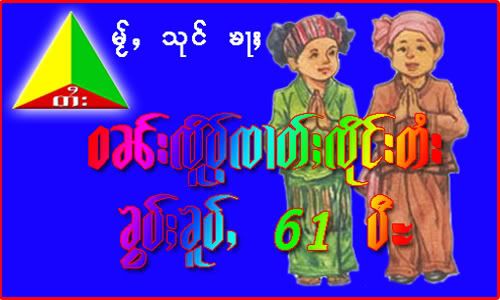by Naw Liang

London, UK and Helsinki, Finland.
Mai soong kha!
I might be cheating a bit with this mini-post, but timeliness is most important feature here.
So, possible guilty feelings of plagiarism aside, this post has come about due to the mounting news and excitement for the upcoming 2103 Shan New Year (28 November 2009). The buzz has reminded me of a news article I picked up last year by Saw Yan Naing about another Shan holiday - Shan National (or State) Day. The following is a short summary and minor expansion of the original, which can be read here.
Certain Shan holidays under scrutiny
While Shan National Day (2009 date unknown) and Chinese New Year (26 January 2009) won't fall on the same day as they did last year, their convergence on 7 February 2008 helped emphasise internal policies and scrutiny against the Shan people, their culture and festivities in Shan State and throughout Burma/Myanmar. The stark contrast between rapturous celebrations held by Burma's growing Chinese community throughout the country, including Shan State capital Taunggyi, and a blanket ban, in place since 2001, on festivities around Shan National Day would have been impossible to miss. The additional imbalance between banning Shan National Day and allowing Shan New Year celebrations in December in Shan State further obfuscates the issue.
Although I lack firsthand knowledge of the ban, it was aptly described/confirmed by Saw Yan Naing last year, who wrote that the Shan had been '...officially barred from publicly marking the event after a regime [sic] edict banned the festival...in 2001, apparently because it was worried about growing political awareness among the Shan." Furthermore, a witness added weight to these claims, stating that "no celebration of the Shan festival was being held there [and that] many Chinese residents were gathering to celebrate Chinese New Year."
Yet, despite increased press in 2008, I (like many others) know that this discrimination is not of character. And, despite the strong internal history of this Shan event, which commemorates the adoption of a Shan national flag and anthem on 7 February 1947, official bans continue this year and into the foreseeable future. Such is life for ethnic minorities in Burma/Myanmar.
But, bans only apply to those who follow them, and the Shan have continued, in the face of official warnings, to hold events throughout Shan State and Burma/Myanmar. As an example, some events, though smaller and more subdued, were held throughout Burma/Myanmar in 2008, including:
The Shan State was the venue small local gatherings as well as more politicised events, such as those held by the Shan State Army (South) at their headquarters in Loi Taileng; and
Yangon was also witness to more subdued festivities, including the offering of alms to monks at a Shan monastery in Yangon's Mayangone Township as well as dance and music performances by famous Shan performers, including the now deceased Sai Htee Saing. Event organiser Nang Boe Seng added that the event, more a commemoration than a celebration, aimed to help the "...Shan people [remember their] culture, tradition and religious customs. We also want the young generation to love and uphold our culture.”
Bigger abroad isn't always the best
These Burma-based events, with the continuing determination of local promoters and supporters, are encouraging to say the least. But it is the fact that the majority of Shan National/State Day celebrations take place overseas (predominately in Yunnan (China) and Chiang Mai and Mae Hong Son (Northern Thailand) and away from the Shan State that takes centre stage, reviving feelings of disappointment and demoralisation. These feelings are much harder to recall.
Let's hope that, some day soon, Shan National/State Day can, along with a myriad of Shan celebrations, be cheered where they ought to be - at home in Shan State.
And, although it might be jumping the gun a bit, mai soong pii mai tai.
Naw Liang.
No comments:
Post a Comment